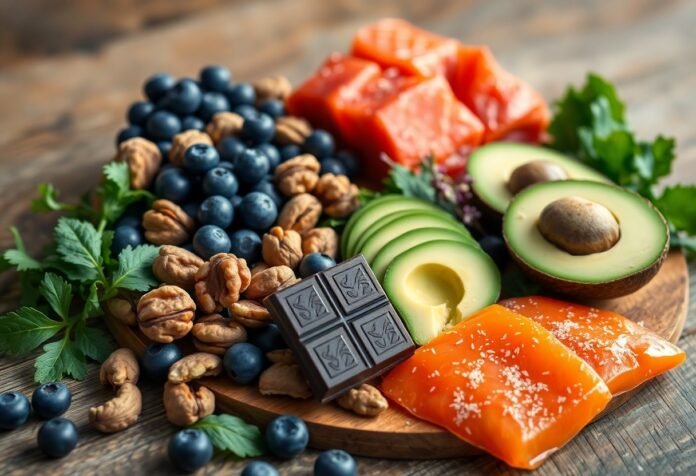Anxiety and depression can profoundly impact your daily life, but you may not realize that what you eat can play a significant role in managing these conditions. By incorporating specific foods into your diet, you can support your mental health and improve your overall well-being. In this post, you’ll discover a selection of nutrient-rich foods that can help alleviate symptoms of anxiety and depression, empowering you to make healthier choices for your mind and body.
Key Takeaways:
- Nutrition can significantly impact mental health; foods rich in omega-3 fatty acids, such as salmon and walnuts, may help reduce symptoms of anxiety and depression.
- Incorporating a variety of fruits, vegetables, and whole grains into your diet can provide important vitamins and minerals that support brain health and mood regulation.
- Probiotic-rich foods, like yogurt and fermented vegetables, can improve gut health, which is increasingly linked to mental wellness and emotional stability.

The Neurotransmitters Connection: How Food Affects Mood
Your mood is deeply intertwined with the levels of neurotransmitters in your brain, which are chemicals that transmit signals throughout your nervous system. Dietary choices can significantly impact the production and balance of these neurotransmitters, ultimately influencing how you feel. For instance, foods rich in certain amino acids, vitamins, and minerals can enhance the synthesis of mood-regulating chemicals, allowing you to better manage feelings of anxiety and depression.
The Role of Serotonin and Dopamine
Serotonin and dopamine play pivotal roles in regulating mood and emotional well-being. Serotonin, often termed the “feel-good” neurotransmitter, is linked to feelings of happiness and contentment. In contrast, dopamine is involved in motivation and pleasure. A healthy balance of these neurotransmitters is vital for maintaining mental health, and your diet can either support or hinder their production.
Nutrients that Boost Neurotransmitter Production
Several key nutrients are vital for boosting neurotransmitter production, including omega-3 fatty acids, B vitamins, and magnesium. Omega-3s, found in fatty fish like salmon and walnuts, are linked to improved mood and cognitive function. B vitamins are vital for converting food into energy and help synthesize neurotransmitters. Foods rich in magnesium, such as leafy greens, nuts, and seeds, can also enhance serotonin levels, promoting relaxation and reducing anxiety.
Incorporating these nutrients into your diet can significantly impact your mood. For example, research has shown that individuals consuming a diet high in omega-3 fatty acids may experience lower rates of depression, while those with adequate B vitamin intake report fewer symptoms of anxiety. By focusing on a diet rich in these specific nutrients, you can create a supportive environment for your brain, fostering resilience against stress and emotional fluctuations.
Superfoods for Mental Resilience
Incorporating superfoods into your diet can significantly bolster your mental resilience, making it easier to combat anxiety and depression. These nutrient-dense foods provide the vitamins, minerals, and healthy fats your brain craves, strengthening its function and improving overall mood. By focusing on specific superfoods, you can take proactive steps to enhance your mental well-being and navigate daily challenges more effectively.
Omega-3 Fatty Acids: The Power of Fish and Seeds
Omega-3 fatty acids, found primarily in fatty fish such as salmon, mackerel, and sardines, as well as in flaxseeds and walnuts, play a vital role in brain health. They have been linked to reduced symptoms of anxiety and depression, as they help regulate neurotransmitters and decrease inflammation. Including these sources of healthy fats in your diet fosters clearer thinking and emotional balance.
Antioxidants: Berries, Nuts, and Their Impact on Mental Health
Foods rich in antioxidants, like berries and nuts, are key players in supporting mental health. Blueberries, strawberries, walnuts, and pecans not only provide necessary nutrients but also combat oxidative stress, which can negatively affect mood and cognitive function. Antioxidants help protect your brain from inflammation and may improve your emotional well-being by enhancing neural communication.
Research shows that antioxidants can have a profound effect on your mental health by reducing oxidative stress, which is linked to anxiety and depressive disorders. Berries, specifically, are packed with flavonoids that have been shown to improve mood and cognitive capabilities. Regularly consuming a handful of mixed berries or a serving of nuts can lead to a noticeable uplift in your mental clarity and emotional stability, allowing you to feel more grounded and resilient during stressful times.
The Gut-Brain Axis: Why Your Digestive Health Matters
Your digestive health plays a pivotal role in your emotional well-being. The gut-brain axis, a complex communication network between your gastrointestinal system and your brain, greatly influences your mood and mental state. An imbalance in your gut microbiome can lead to the disruption of neurotransmitters like serotonin, which are necessary for regulating mood. By nurturing your gut health, you may enhance your mental clarity and stability, creating a foundation for better emotional health.
Probiotics: Fermented Foods That Support Anxiety Relief
Probiotics, found in fermented foods like yogurt, kefir, and sauerkraut, contribute to a healthier gut microbiome, which can lower anxiety levels. These beneficial bacteria help regulate the production of neurotransmitters and improve the gut’s overall functionality, reducing inflammation and enhancing your body’s stress response. Incorporating these foods into your diet can be a delicious and effective way to support your mental health.
Fiber-Rich Foods: Feeding Your Microbiome for Mood Stability
Fiber-rich foods, such as whole grains, legumes, fruits, and vegetables, play a vital role in maintaining gut health and stability in your mood. By nourishing your microbiome with an abundance of dietary fiber, you promote the growth of beneficial bacteria that produce short-chain fatty acids, positively affecting mood regulation. These foods can help you maintain a balanced blood sugar level, which is necessary for emotional stability.
Emphasizing fiber in your daily meals can significantly impact your mood and anxiety levels. Whole grains like oats and brown rice, lentils, beans, and a variety of fruits and vegetables are all excellent options. Research suggests that diets high in fiber are associated with lower rates of anxiety and depression, creating a friendly environment in which beneficial gut bacteria thrive. As these bacteria flourish, they produce vital compounds that not only support gut health but also contribute to improved mood regulation and emotional resilience. Prioritizing fiber helps create a robust microbiome, thereby enhancing your overall mental well-being.
The Psychological Impact of Meal Patterns
Your meal patterns can profoundly influence your psychological state. Regular meal times help establish a sense of routine, which can reduce feelings of anxiety and uncertainty. Engaging with food at consistent intervals provides stability in an otherwise chaotic environment, fostering a deeper connection with yourself and nourishing your mind alongside your body.
The Benefits of a Balanced Diet on Emotional Well-being
Mindful Eating: Harnessing the Power of Presence at Meals
Mindful eating emphasizes the importance of being present during meals, allowing you to develop a healthy relationship with food. Paying attention to the flavors, textures, and aromas of your meals enhances your dining experience and promotes better digestion, ultimately supporting your mental health.
Practicing mindful eating involves more than just focusing on the food itself; it encourages you to appreciate the act of eating. Slowing down and savoring each bite can reduce stress by decreasing negative thoughts and promoting enjoyment. The more you tune in to your body’s hunger signals and acknowledge your emotions while eating, the easier it gets to distinguish between true hunger and emotional cravings. This awareness can empower you to make healthier food choices and cultivate positive associations with mealtime, enhancing your emotional resilience.
Practical Strategies for Incorporating Mood-Boosting Foods
Integrating mood-boosting foods into your daily routine can be seamless when you adopt practical strategies. Focus on gradually introducing these foods to avoid feeling overwhelmed. You might experiment by swapping out less healthy snacks for options rich in omega-3 fatty acids or antioxidants. Involving your family or friends in the process can also make it more enjoyable and motivate you to stay on track.
Meal Prep Tips for Success
Meal prep serves as a key strategy for incorporating nutritional ingredients effectively. Begin by planning your meals for the week, focusing on integrating whole foods like leafy greens, nuts, and fruits. Make a grocery list to ensure you have all the necessary ingredients, and consider batch cooking to simplify your week. Keep in mind to:
- Designate a specific day for meal prep.
- Use clear containers for easy portioning and storage.
- Create a variety of meals to keep your taste buds excited.
- Incorporate different cooking methods to enhance flavors.
After you establish a routine, you’ll notice how easily you maintain a balanced diet packed with mood-boosting ingredients.
Easy Recipes Featuring Mental Health-Boosting Ingredients
Putting together simple recipes that emphasize mental health-boosting ingredients can inspire you to eat more mindfully. Consider whipping up a salmon and quinoa bowl, where omega-3-rich salmon pairs beautifully with fiber-packed quinoa and sautéed spinach. A smoothie featuring spinach, banana, and Greek yogurt provides a delicious way to intake probiotics, potassium, and magnesium—all beneficial for mental well-being. You can also try a dark chocolate oatmeal for breakfast, allowing you to enjoy a sweet treat with mood-enhancing nutrients. These ideas highlight how easy it is to prepare delicious, nutritious meals that uplift your mental states.
Conclusion
Conclusively, incorporating foods that help fight anxiety and depression into your diet can significantly impact your mental well-being. By choosing nutrient-rich options like fatty fish, leafy greens, nuts, and fermented foods, you can support your brain health and enhance your mood. Additionally, maintaining a balanced diet filled with these beneficial foods can promote overall emotional stability. As you make mindful dietary choices, you’ll empower yourself to better manage anxiety and depression, fostering a healthier and happier lifestyle.
FAQ
Q: What types of foods are beneficial for reducing anxiety and depression?
A: Nutrient-rich foods can play a significant role in alleviating anxiety and depression. Incorporating foods high in omega-3 fatty acids, such as fatty fish (like salmon and sardines), can promote brain health. Whole grains, such as quinoa and brown rice, provide sustained energy and stabilize blood sugar levels, which can positively impact mood. Leafy greens, berries, nuts, and seeds are also excellent choices, as they are packed with antioxidants and vitamins that support mental well-being.
Q: Are there specific vitamins or minerals that help manage stress and anxiety?
A: Yes, certain vitamins and minerals are linked to mood regulation. For instance, B vitamins, particularly B12 and folate, are vital for brain health and can reduce symptoms of depression. Magnesium is another key mineral known to help with relaxation and stress reduction. Including foods rich in these nutrients, such as leafy greens, legumes, and whole grains, can effectively support mental health.
Q: How does gut health relate to anxiety and depression?
A: The gut-brain connection plays an important role in mental health, as a healthy gut microbiome can contribute to the production of neurotransmitters that regulate mood. Foods that are high in fiber, like fruits, vegetables, and whole grains, promote good gut health. Additionally, fermented foods such as yogurt, kimchi, and sauerkraut can introduce beneficial probiotics to support a balanced gut microbiome, which may help alleviate symptoms of anxiety and depression.
Q: Can hydration levels impact mental health?
A: Yes, hydration is often overlooked but plays a significant role in mental health. Dehydration can lead to increased feelings of anxiety and fatigue. Maintaining proper hydration by drinking enough water throughout the day can improve mood and cognitive function. Herbal teas and foods with high water content, like cucumbers and watermelon, can also contribute to adequate hydration, supporting overall mental well-being.
Q: Is caffeine consumption linked to anxiety and depression?
A: Caffeine can have varying effects on anxiety. While moderate consumption may boost energy and mood for some individuals, excessive caffeine intake can lead to increased anxiety and disrupt sleep patterns, which can exacerbate depressive symptoms. It may be beneficial to monitor caffeine intake and consider alternatives like herbal teas or decaffeinated options, especially for those sensitive to its effects.
